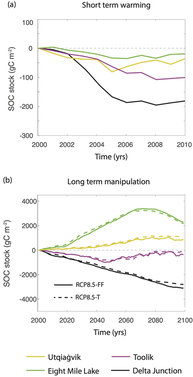Our broad interests here relate to how interactions between plants-microbes control carbon and nutrient cycling under both short-term (e.g., widlfires), and long-term (e.g., warming, elevated CO2) disturbances.
|
Ecosystem response to disturbance: Climate warming is occurring fastest at high-latitudes. Understanding, the impact of chronic climate change, and related increase in wildfire occurrence, is critical for understanding future carbon-climate feedbacks. We address these questions using a well-tested, mechanistic model (ecosys, e.g., Grant et al., 2017), which simulates the interdependent physical, hydrological, and biological processes that govern ecosystem responses to perturbation. This model also includes a mechanistic treatment of carbon, water, nitrogen, and phosphorus dynamics within soils, microbes (bacterial, archaea, and fungi), and plants.
Specific questions we are addressing include,
|
Funding: Next Generation Ecosystem Experiment located in Alaska (NGEE-Arctic), funded by DOE, Biological and Environmental Research Program.
